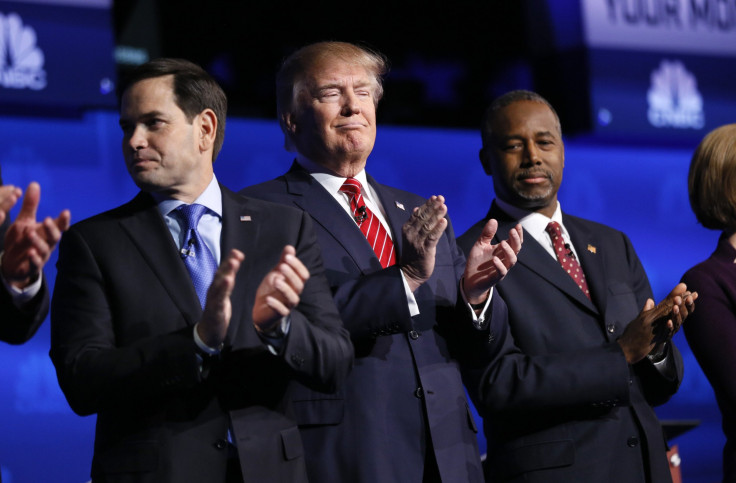
While Latino-specific issues have come up in past debates, Thursday’s Telemundo/CNN debate will bring them to the forefront, focusing on those most important to Latino viewers. It’s also going to take place in Austin, Texas, the liberal capital of conservative border state. As a result, you can expect a few trends and topics that might manifest at tonight’s Telemundo/CNN debate. Here’s our round up of 6 things to look for in the debate.
(And for those of you who want a presidential debate drinking game, we’ll give suggestions.)
Liberal protesters, hecklers: Austin is a liberal oasis in conservative Texas. It’s also a college town. In a contentious election year, don’t be surprised if someone stages a protest or smuggles a sign into the audience.
(If protesters interrupt, take a shot)
Trump claiming to have one the Latino vote in Nevada
Trump has already started to tell reporters that he’s “number one among Latinos,” following this week’s Nevada caucus. That’s because the businessman earned around 40 percent of the Hispanic vote. But outside of Nevada 8 in 10 Hispanic voters have a negative view of Trump, according to a Univision/Washington Post poll. Either way, Rubio and Cruz -- both Cuban-Americans -- might be on the defensive about why they didn’t win the Hispanic Vote in the state.
(If Trump says “Hispanic or Latino” take a sip. If he says he “loves them” take two.)
Spanish
GOP candidates have sparred over Spanish twice in the debates. First, it was Rubio telling Trump that he had learned his conservative values from his Spanish-speaking grandfather . Then it was Rubio versus Cruz, who argued over whether or not Cruz understands Spanish. Not that Jeb Bush is out of the race, Rubio is the only fluent Spanish speaker left in the race. At the Telemundo debate, some questions might be asked originally in Spanish, giving Rubi (and possibly Cruz?) more time to digest a question.
(If someone says a word in Spanish, take a sip.)
Hispanic media
Telemundo news anchor Maria Celeste Arraras will be the first Spanish-language outlet reporter to have a seat at the debates. She says that she’ll be asking narrow questions to candidates regarding Latino issues.
"Our audience is trying to figure out the two Hispanic candidates in the Republican party and trying to see how Hispanic they are or are not," Arrarás told Politico. "Not that that’s going to make them vote for them or not….but I think they’re trying to understand these two candidates that at times speak very tough on immigration. They’re trying to reconcile those two seemingly opposite views and postures, but they’re being considered [by Hispanic voters]."
(Don’t drink during these questions; pay attention!)
Immigration
Arrarás might grill Ted Cruz over what appears to be a shift in his immigration policy. Specifically, Cruz has implied recently that he agrees with Donald Trump that immigrants in the country illegally should be rounded up en masse and deported. While Rubio has been questioned for his reverse of support for comprehensive immigration reform, Arrarás might go further, and ask Rubio if he would support a compromise. She might also ask for specifics about the candidate's education plans, another area that is important to Latino voters.
(Take a sip every time someone says the word “wall.”)
Justifying their campaigns
Ben Carson and John Kasich will need to justify their continued participation in the races after poor showings in early states. Ted Cruz and Marco Rubio may indirectly make the case that they are the alternative to Trump.
(Drink water; it’s gonna be a long night.)
© 2025 Latin Times. All rights reserved. Do not reproduce without permission.




